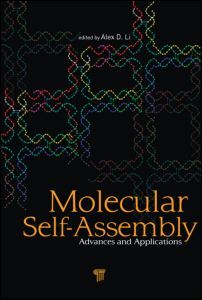Description
Molecular Self-Assembly
Advances and Applications
Coordinator: Dequan Alex Li
Language: English
Subjects for Molecular Self-Assembly:
Keywords
NMR Spectrum; NMR Data; Toward Intelligent Materials; Crystal Packing; The Self-Assembly of Lipophilic Guanosine Derivatives; Upfield Shift; Bipyridinium Derivatives; Hydrogen Bonding; Functional Microstructures by Self-Assembly; Aromatic Guests; Colloidal Superparticles from Artificial Atoms; CR Molecule; Molecular Self-assemblies; Copyright Wiley VCH Verlag GmbH; Self-assembly Processes; Molecular Assemblies; HOPG; AFM; Molecular Squares; 31P NMR; Chiral Assemblies; Solvophobic Interactions; Conventional Amphiphiles; Molecular Codes; Spectral Switching; Organic Semiconductors; DCB; Satellite Tobacco Necrosis Virus; Finite Assemblies; Perylene Units
· 15.2x22.9 cm · Hardback
Description
/li>Contents
/li>Readership
/li>Biography
/li>
In the past several decades, molecular self-assembly has emerged as one of the main themes in chemistry, biology, and materials science. This book compiles and details cutting-edge research in molecular assemblies ranging from self-organized peptide nanostructures and DNA-chromophore foldamers to supramolecular systems and metal-directed assemblies, even to nanocrystal superparticles and self-assembled microdevices
Toward Intelligent Materials. E And Z Secondary Amides in Supramolecular Nanotubes and Nanospheres. Control of Chiral Assemblies Through Hydrogen Bondings for Helical Architectures. The Self-Assembly of Lipophilic Guanosine Derivatives. Self-Assemblies, Folding, and Properties of Perylene Monomers, Oligomers, and Polymers. Superamphiphiles for Controlled Self-assembly and Disassembly. Well-Defined Porphyrin Architectures from Self-Assembly and Dewetting. Photophysics and Photochemistry of Molecular Recognition and Sensing with Metal-Directed Macrocyclic Systems. Pt/Pd–Ethynyl Bond Containing Fluorescent Molecular Architectures as Sensors for Nitroaromatics. Pd(II) and Pt(II) Metal-Directed Self-Assembly of Supramolecular Structures Based on N-Monoalkyl-4,4¢ -Bipyridinium Derivatives. Colloidal Superparticles from Artificial Atoms. Functional Microstructures by Self-Assembly.
Alex D. Q. Li received his BS in polymer chemistry at Jilin University, China, his MS and Ph.D. in inorganic chemistry from Northwestern University, Evanston, Illinois. After graduation, he was honored with a postdoctoral director fellow at Los Alamos National Laboratory, Los Alamos, New Mexico, where he later became a technical staff member. At Los Alamos, he led a research group working on chemistry of materials and microsensors for volatile organic compounds, which received R&D 100 award in 1995. Inspired by teaching and innovative research, Dr. Li joined the faculty at Washington State University (WSU) in 2000, where he initiated his research on foldamers and later received the Arnold and Mabel Beckman Young Investigator award. His research areas include macromolecular design and engineering, advanced materials synthesis, bionanotechnology, self-assembly, and supramolecular systems. The philosophy in his group is to use novel methods to construct advanced materials, with an emphasis on molecular design and innovative approaches to demonstrate new concepts, principles, and applications in the chemical, physical, and biological sciences.
These books may interest you

Supramolecular Polymers 74.82 €



